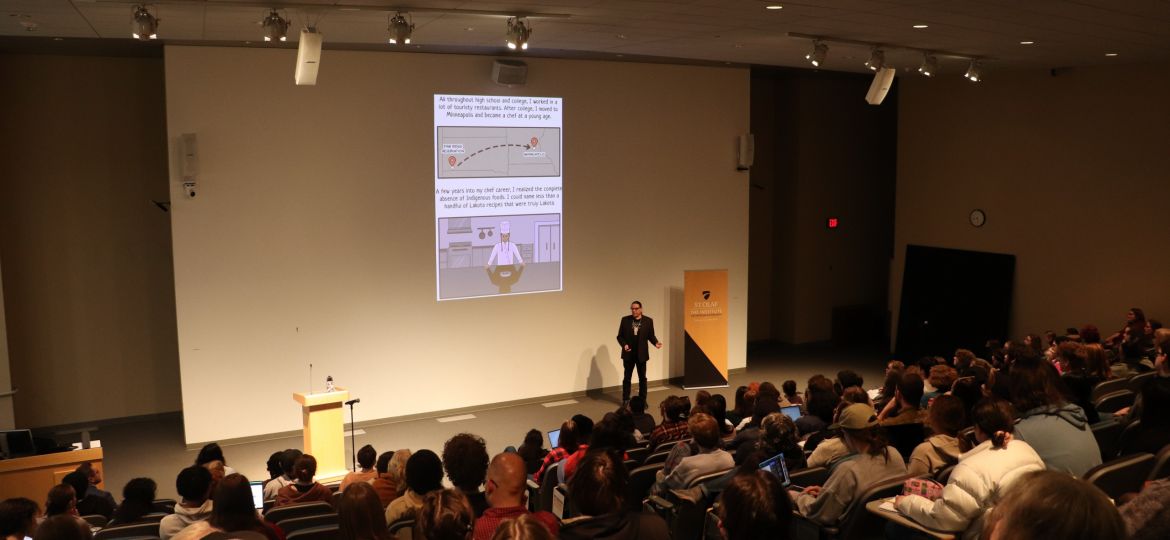
Photo by Charlotte Smith/The Olaf Messenger
On March 5, the Institute for Freedom and Community (IFC) hosted Sean Sherman, a chef and advocate for Indigenous foodways. Sherman gave a talk titled “The (R)evolution of Indigenous Foodways,” which focused on his life and his work as a co-founder of his James Beard Award-winning Minneapolis restaurant, Owamni, one of the only restaurants in the country to focus exclusively on Indigenous American cuisine.
After being introduced by his sister, Sherman opened his talk with a few quips about the popularity of his restaurant —“I can’t tell you how to get a reservation… I just grew up on one”— before launching into an information-packed story about his own life, as well as the history that led him to become an advocate for Indigenous foodways.
Sherman, who is a member of the Oglala Lakota tribe, was raised on the Pine Ridge Reservation in South Dakota. In his talk, which was accompanied by a series of illustrated presentation slides, he described the Commodity Food Programs that sent food to Pine Ridge while he was growing up — the government provided mostly unhealthy processed foods such as canned meat and gallon jugs of corn syrup. He said that “what I grew up with had nothing to do with Native American foods.”
Eventually, Sherman worked his way up through the Minneapolis restaurant scene, but didn’t feel completely satisfied there. “It was a few years into my career that I realized the absence of Indigenous foods,” he said. “I’d been studying all this food from all over the world, [but I didn’t] know that much about my own heritage food.”
He began to study Indigenous foods by a process of elimination, learning which food ingredients had not been brought to America through colonization — this includes foods like wheat flour, sugar, beef, pork, and chicken.
As he continued this process, Sherman said that, “What really became important was understanding why we lost this knowledge. Why did I grow up in a tribal community, and have no, or very little, access to Native American foods?”
Exploring this question led him to identify America’s history of aggressive colonialism as the reason why Native Americans have largely been forced to lose touch with the foodways that historically nourished them. Sherman discussed this history at length, focusing on the destruction of the environment and Native agricultural systems which occurred during the colonization of the United States. He also discussed the loss of knowledge that resulted from the residential school programs, which, among other abuses, interrupted a vast number of Indigenous children’s ability to learn traditional knowledge about foods.
Eventually, Sherman was inspired to create The Sioux Chef, an Indigenous food education and catering business. In 2017, he published a cookbook by the same name. In 2021, his Minneapolis restaurant, Owamni, opened and was met with immediate success — in 2022, it won the James Beard Foundation Award for Best New Restaurant.
Sherman stressed that a return to Indigenous foodways is essential to improving people’s health, especially the health of Native Americans, who currently experience much higher rates of diet-based illnesses, such as diabetes.
He also said that Indigenous foodways can combat environmental crises, criticizing the environmental harms such as pesticide runoff that are caused by conventional agriculture. “We should really be focused on learning more from Indigenous communities who had so much vast agriculture, starting at the bottom of Mexico, and [still] didn’t have to use chemicals on their food,” Sherman said.
He also said that Indigenous foodways can be a vital way for Native people to connect with their culture. Owamni, for example, serves wild rice, which is both a vital food source for the Ojibwe people of northern Minnesota, as well as a sacred feature of their traditional spiritual practices.
Sherman said that Indigenous food sovereignty, meaning the right of Indigenous peoples to produce and eat their traditional foods, is an essential element of the movement for Indigenous rights.
He said that the act of “reclaiming Indigenous health and culture through food” is a means of “taking the two fronts that the US government used against us by removing us from our food and taking away our education… and using those things as the two pillars that strengthen us.”
The Sioux Chef aims to create entirely new foodways to empower Native communities by working with Indigenous farmers and sellers to stock Indigenous-owned restaurants.
Sherman concluded his talk by saying that “Food is a lot of power, and we should take that power back… if you control your food, you control your destiny. We truly believe that the future is Indigenous, and we can get there…we just have to be smarter.”
This talk was part of the IFC’s speaker series on “Food Policy and Food Politics.” Students can visit their website for information on upcoming talks.

